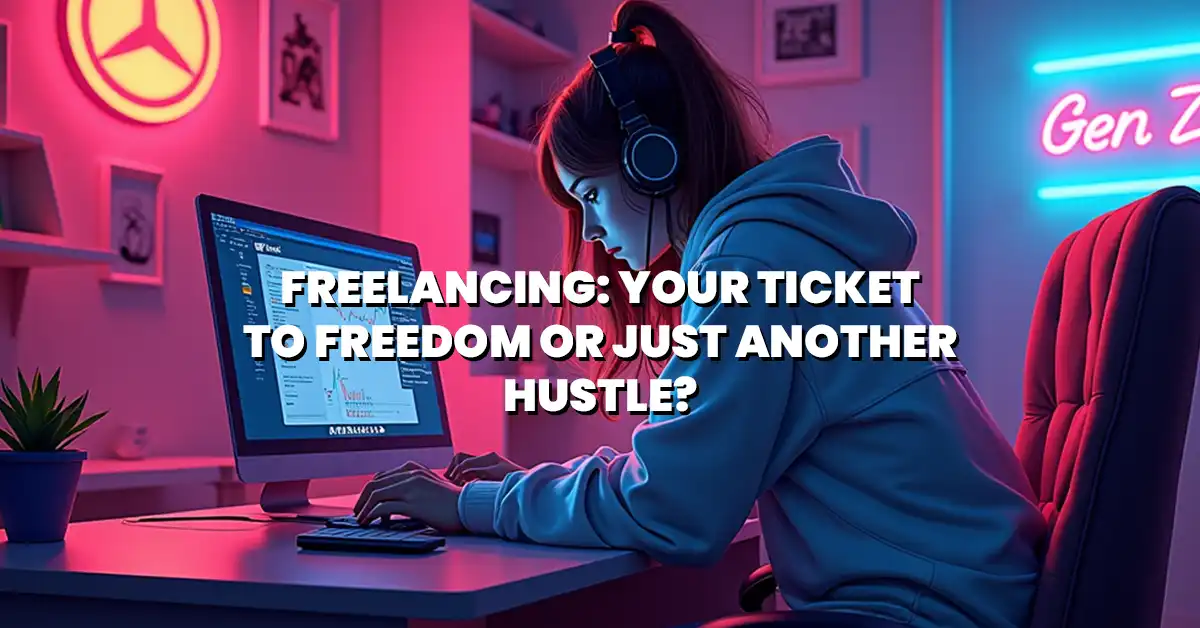
You’re scrolling through your feed. Everyone’s either chilling by a beach or talking about how they “made $10K in a month with just their laptop.” Freelancing seems like a dream, right? Work from anywhere, choose your projects, and, most importantly, be your own boss. But where do you even start? Is it all just smoke and mirrors or can you actually break into this gig and make it work?
Let’s dive into how you can crack the code and kickstart your freelancing career without getting lost in all the noise.
Where Can I Start Freelancing?
If you’re wondering, “Where do I even begin?” you’re not alone. The freelancing world can feel like a wild jungle with opportunities lurking around every corner. But before diving headfirst, you’ve got to lay down some groundwork.
Find Your Superpower (AKA Skillset)
Start by figuring out what you’re actually good at. Can you design killer graphics, write copy that sells, or maybe code like a wizard? The freelance market thrives on specialized skills, so zero in on your strengths. If you’re a jack of all trades, try narrowing it down. Remember, clients usually prefer specialists over generalists.
Test the Waters Locally
Freelancing doesn’t always mean jumping straight onto big platforms. Begin small—offer your services to local businesses, friends, or even charities. It’s a great way to build your portfolio without the pressure of competing on global platforms right out the gate.
Create Your Online Portfolio
An eye-catching portfolio is your golden ticket in freelancing. Whether you’re a designer, writer, or virtual assistant, a killer portfolio sets you apart. Platforms like Behance for designers, Clippings.me for writers, and GitHub for developers are fantastic places to showcase your work. Got no experience? No sweat! Start with mock projects or personal passion projects. Your portfolio should scream, “I’m ready for business!”
Where to Learn Freelancing?

You’re pumped, but now comes the learning curve. Freelancing isn’t just about being good at what you do—it’s about learning the ropes of managing clients, pricing your services, and marketing yourself like a pro.
The YouTube University
When in doubt, YouTube it out! You’ll find tons of free content on how to get started, improve your skills, and avoid newbie mistakes. Channels like “The Futur” for creative freelancers, “Hustle Ninjas” for beginners, and “Ali Abdaal” for productivity tips are gold mines.
Online Courses for Skill & Strategy
Want more structured learning? Platforms like Coursera, Udemy, and Skillshare have specific courses designed to get you up to speed. If you’re on a budget, opt for free resources like Coursera’s free-tier courses or browse Skillshare’s trial period to soak up some quick knowledge.
- Coursera: Check out their freelancing and entrepreneurship programs.
- Udemy: They have niche-specific courses like “Freelancing for Writers” or “Upwork Mastery.”
- Skillshare: Perfect for creatives looking to refine their craft.
Join Freelancing Communities
Freelancing can feel lonely, but it doesn’t have to be. Communities like r/Freelance on Reddit, Discord servers, or Facebook groups can help you connect with other freelancers. Whether it’s sharing tips, venting about client drama, or finding your next gig, these spaces can be super valuable. Plus, networking never hurts.
Which Freelancing Platform is Best for Beginners?

Choosing the right platform is like picking the right weapon in a game—you’ve got to know your playstyle.
Upwork: The All-Rounder
Upwork is a massive platform with opportunities in almost every field imaginable. It’s great if you’re versatile and willing to take on a variety of projects. The downside? It can be competitive, and you might need to spend some time hunting for decent-paying gigs.
- Best for: Writers, graphic designers, virtual assistants, and developers.
- Pro Tip: Start small to build your rating, then raise your rates once you’ve established yourself.
Fiverr: The Quick-Hit Hustle
Fiverr started with $5 gigs but has evolved into a full-blown marketplace where you can sell all sorts of services. If you have niche skills or want to offer quick-turnaround services, this is a solid choice. Just be ready to deal with a lot of lowball offers at first.
- Best for: Logo design, voiceovers, quick copywriting gigs, and social media tasks.
- Pro Tip: Craft attention-grabbing gig titles and optimize your profile with relevant keywords.
Freelancer.com: The Mixed Bag
Freelancer.com is similar to Upwork but tends to have lower-paying gigs, which isn’t necessarily bad if you’re just getting your feet wet. It also offers contests, allowing you to showcase your skills and win projects by competing with other freelancers.
- Best for: Entry-level freelancers or those who enjoy competitive bidding.
- Pro Tip: Bid smart and avoid the race to the bottom. Focus on value, not price.
Toptal: The Elite Club
This one’s for the pros. Toptal only accepts the top 3% of freelancers, so if you’ve got the chops, it can be incredibly lucrative. They focus on high-end clients, which means higher rates but also higher expectations.
- Best for: Seasoned freelancers with a solid portfolio.
- Pro Tip: Only apply when you’ve got experience and confidence in your skillset.
Which Freelancing Job is Best for Beginners?

The answer to this largely depends on your interests and existing skills. But some jobs have a lower barrier to entry, making them perfect for beginners.
Content Writing: Words Sell
If you’ve got a way with words, content writing is a great entry point. There’s always demand for blog posts, product descriptions, and web copy. The competition is tough, but if you can carve out a niche or offer something unique, you can stand out quickly.
- Key skills: Strong grammar, SEO basics, and a flair for engaging copy.
Graphic Design: Create, Inspire, Repeat
Graphic design is another hot freelance job for beginners. With free tools like Canva and an abundance of tutorials, you can get started without fancy degrees. Focus on social media graphics, logos, or even printable designs.
- Key skills: Creativity, an eye for detail, and knowledge of design tools.
Virtual Assistance: Help Others Hustle
VA roles are super versatile and often in high demand. You could be managing someone’s calendar, organizing emails, or even handling social media. This role is all about being reliable and organized.
- Key skills: Communication, time management, and familiarity with productivity tools like Trello or Asana.
Social Media Management: Trend-Savvy Hustler
If you live and breathe TikTok trends or know how to create content that pops on Instagram, social media management could be your jam. Small businesses and startups are always looking for someone who “gets” the digital world.
- Key skills: Creativity, trend awareness, and an understanding of different social media platforms.
Leave a Reply